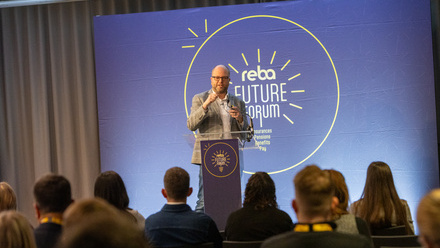Intrinsic value: the crucial link between benefits and business strategy

Why is that? And how does it come to be? Although there isn’t causality, it certainly isn’t a coincidence that great businesses offer great benefits.
The essence of the EVP
To cut a long story short, there is one key ingredient that every business needs to drive growth – its people. To outperform the competition, companies need the best people and those people typically have a sense of their worth and have expectations about what employers need to offer them.
It is this notion that led many employers, especially out of the US, to start defining and even marketing their distinct “Employee Value Proposition” (EVP), literally the selling points for why a person would want to work for them.
That EVP is designed not only to attract talent, but to drive employee engagement and performance. For many employees, part of the appeal of the right business will be the role and the shared purpose, but it would be churlish to imagine that reward doesn’t play a huge role in this.
And within reward, benefits play a significant role. Although there are often geographical and demographic differences in the definition and perceived value of benefits, there is an expectation amongst almost all employees that benefits form a large portion of their contractual reward.
The role of employee benefits
So, why do benefits play such an important role? For one, they typically support fundamental needs we all have, from our future financial security [in retirement], to protecting us in the event of serious illness, to providing access to quality healthcare. Those are all pretty high on the hierarchy of needs.
In addition to that, there is the psychological dilemma for many of us that we know we would be bad at meeting these needs ourselves, even when we have the income to do so. As a result, we value the investment companies make, not only financially, but also in time, which we don’t have to make for some of our biggest concerns.
All things being equal, an employee would typically take a good basic salary and good benefits over a higher basic salary and no benefits, meaning that employers aren’t simply adding to their costs in providing benefits.
Based on that, a great benefits package helps attract talent into the business, so they can play their role in fulfilling the company’s strategy. But does it play a greater role than that?
The link between benefits and employee wellbeing
This is where benefits have evolved in the last five years. All of the above remains true, but in the past, benefits were seen almost entirely as an element of reward strategy, designed to incentivise the best people to join companies and to perform.
Now, however, they play an equally important role in driving employee wellbeing. There is no doubt that, with continued work, social, financial and technological pressures we all face in our daily [working] lives, our wellbeing has taken a knock. Employees have certainly looked to their employers to be more understanding and accommodating of these strains, as evidenced by how much more flexibility we work with today (even pre-Covid).
In addition, if these personal challenges are left unsupported, they can impact even the highest performing people in a company, with performance suffering. There is mutual benefit for companies investing in wellbeing.
With benefits focusing on wellbeing, not only can it drive stronger company culture, which adds to the EVP (who wouldn’t want to work for a business that cares for its people?), it also helps drive company performance and growth by maintaining the productivity and motivation of their people.
And so we come full circle. All businesses want to grow and perform. In the past, the relationship between this goal and benefits was less tangible, as benefits were mainly seen as a way to attract talent. Now the focus has shifted towards wellbeing, which in turn directly drives performance, so the intrinsic impact of benefits is clearer than ever in their ability to shift the needle on business strategy and results.
The author is Matthew Gregson, head of corporate at Howden Employee Benefits & Wellbeing.
This article is provided by Howden Employee Benefits & Wellbeing.
Supplied by REBA Associate Member, Howden Employee Benefits
Howden provides insurance broking, risk management and claims consulting services, globally. We work with clients of all sizes to provide dedicated employee benefits & wellbeing consultancy.







